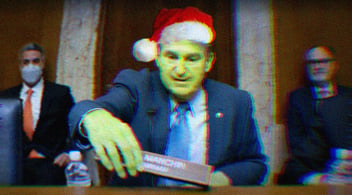Election Denials.
Asheville, Israel & Inequality.
 Image Description: A man with his hands on his head in frustration. An abstract black cloud rises from his brain, symbolizing chaos.
Image Description: A man with his hands on his head in frustration. An abstract black cloud rises from his brain, symbolizing chaos.
Part One: Asheville
A relative of mine who works in the renewable energy financing sector said something a couple of years ago that really stuck with me. He and his wife were thinking about having a child and evaluating the best places to start a family while keeping their career prospects open. As a New Yorker, I’m used to these conversations along the age spectrum because of the insane cost of living. And it seems like nine out of ten relocation conversations involve somewhere in the southeast of the United States. ‘So and so moved to Florida’; ‘our friends just bought a place in South Carolina—twice the size, half the price’; ‘there’s a ton of New Yorkers in North Carolina, it’ll feel just like home.’ Blah, blah, blah.’
But my relative wasn’t thinking that way. According to the models he and his team had built, a band of real estate from upstate New York through Quebec will have more favorable climate conditions in the coming decades. Investing down south was simply more of a risk for the large scale projects they work on. Because, you know, climate change.
North Carolina in particular has seen a huge influx of New Yorkers. In fact, New Yorkers make up the largest percentage of transplants in the state. And one of the idyllic places we often hear about is beautiful Asheville, North Carolina.
Asheville is one of the areas in the United States that has been billed as a so-called “climate haven” or “receiving zones of climate migration.” Building on the success of this type of campaign and possibly even the models my relative and his team are building, cities such as Madison, Wisconsin; Ann Arbor, Michigan; Buffalo, New York; and Burlington, Vermont have latched onto this idea as a marketing tool.
But flash floods in Vermont have become more common in recent years due to warmer weather and more precipitation. Buffalo’s infamous snow storms are deadlier than ever. Wisconsin experiences an average of 23 tornadoes per year. And although Asheville is located inland, Helene’s intensity caused extensive damage, highlighting the vulnerability of mountainous regions to hurricanes.
As the storm made its way across the Southeast, heavy rainfall overwhelmed rivers and streams, leading to severe flooding in Asheville and the nearby Blue Ridge Mountains. The French Broad River, which runs through Asheville, swelled beyond its banks, inundating homes, businesses, and infrastructure. Many parts of the city were submerged, and residents faced displacement as floodwaters entered their neighborhoods. Roads were washed out, and landslides became a dangerous reality due to the saturation of the soil in the region’s steep terrain.
The devastation was compounded by the isolation of some communities, as fallen trees and landslides blocked major roads, making rescue and relief efforts difficult. In rural areas surrounding Asheville, farmland and livestock were heavily impacted, leading to as of yet unknown long-term economic hardships.
This week in the Vice Presidential debate between J.D. Vance and Tim Walz, the candidates were pressed on the issue of climate change against the backdrop of the devastation in North Carolina. Each man expressed sorrow at the tragic events before moving cooly into the same old talking points we’ve been hearing for years. Vance said he didn’t want to argue about “weird science” but said if one were to believe that carbon emissions are to blame for climate change then the answer is to reshore manufacturing. Then stated that we’re the “cleanest economy in the world.”
Walz made sure to hammer home the point that we’re producing more oil and natural gas than ever before and that the Biden/Harris administration created more manufacturing jobs. After burnishing the country’s resume on clean energy and oil and gas production, he concluded saying that we can do it all and need to “start thinking about how do we mitigate these disasters.”
In The Future of Denial, author Tad Delay writes, “Perhaps our descendants look back on the lack of urgency in the long twenty-first century as a great Dithering.”
It seems we’ve normalized the talk of climate change already to such a degree that growing our manufacturing base is seen as a logical answer to battling the effects of it. Delay speaks to this level of normalization by recounting Kim Stanley Robinson’s dystopian novel New York 2140:
“Set in its titular city and year, multimeter sea level rise overcomes a seawall and permanently inundates lower Manhattan. Instead of abandoning the city, people occupy buildings that occasionally collapse into eroded foundations. They travel by gondolas and skywalks, by boats instead of taxis. They trade financial instruments indexed to sea level rise and property values. All normalized. Robinson pitched the story as an absurd extension of capitalism beyond ecological limits, but it’s not prediction…since fiction isn’t about the future; it’s the now turned up a notch.”
Part Two: Israel
One hates to be ethnocentric, but it really feels like Israel is attempting to time its own October surprise to impact the American election. Israel opened a wider conflict on Lebanese soil a few weeks ago with a high tech terrorist attack through low tech devices before engaging in an all out bombing campaign this week in Beirut and several other areas.
As usual, the Israeli government claimed these were all precision attacks on high value targets within a terrorist network. And, as usual, the U.S. media dutifully repeated this claim while referring to Hezbollah as a “militant terrorist organization.” Buried further down in every mainstream reported piece was news of the estimated 1,000 Lebanese civilians killed in the last month. Put another way, the death toll in Lebanon this month is 25% higher than Israel’s revised figure of 767 Israeli civilians killed by Hamas on October 7, 2023.
Just some perspective.
But back to the timing of it all. Israel’s surprise bombardment of Lebanon (it’s now sending in ground troops) was guaranteed to draw a response from Iran. This is on top of Mossad assassinations of Hamas and Hezbollah affiliates in Tehran over the summer, a tremendous embarrassment to the Iranian government. The assassinations reverberated throughout the Middle East, even shaking the tepid alliance between Iran and Iraq. So when Iran sent a barrage of long-range missiles into Israel’s airspace it was hardly a surprise.
Israel’s primary booster and funder in the world is in the middle of an election, which means it’s difficult to secure funding and support it desperately needs. Its economy has been tanking for longer than the war in Gaza, which has dramatically exacerbated the situation. Regardless of the outcome of the U.S. election, Congress may very well be deadlocked on funding outside of a catalyzing circumstance. Netanyahu knows that the one thing we won’t ignore is Iran so he may be deliberately stoking this fire. Otherwise, it’s difficult to understand why he would push his depleted forces into an all out war on multiple fronts.
Voting is already underway in the United States so it’s difficult to know how much a full scale war in the Middle East will actually impact the results. But it would call Congress into action at the precise moment that it’s looking to maintain the status quo. Nobody really knows what comes next and that kind of uncertainty can wreak havoc on polling data. For Netanyahu, however, an all out war with Iran is the most certain way to galvanize our elected officials. And it’s important to remember that Israel is in the most precarious economic position it has perhaps ever been. So my guess is he’s counting on this opening up the purse strings and the cherry on top would be to tip the balance of the election toward Donald Trump whose talking points on Israel are far better than Biden’s.
How so?
Because he’s keeping it simple. You heard it from Vance at the Vice Presidential debate. All they have to do is keep repeating that Russia, Hamas, Hezbollah and Iran wouldn’t have dared to invade Ukraine and Israel respectively under his watch because they’re all afraid of him. The messaging is so simple even Trump can’t fuck it up.
Part Three: Inequality
The recent strike by dockworkers, represented by the International Longshoremen’s Association (ILA), is already significantly impacting ports along the U.S. East and Gulf Coasts. This action, the first of its kind since 1977, is rooted in disagreements over wages and the automation of port operations, which the union argues could jeopardize jobs. The workers are demanding substantial pay increases to compensate for inflation and oppose the growing trend of automation in port logistics.
All told, the strike affects 36 major ports, including key facilities in New York, New Jersey, and Florida. If the work stoppage extends beyond a few weeks, it could lead to shortages of certain goods, especially in industries like automotive and pharmaceuticals. However, many companies preemptively stocked up on goods in anticipation of the strike, meaning that immediate consumer impacts may be limited.
As the world emerged from the pandemic, broken global supply chains had differing effects on the economy. On the one hand it was a significant driver of inflation, though as we’ve demonstrated in prior episodes, multinational corporations took great advantage of this phenomenon to raise prices beyond rational limits, using supply chain shocks as cover for corporate greed. The result was a double shock to the consumer wallet. Another effect was the need to hire a great number of workers to meet pent up demand from the sudden halt to all economic activity.
Taken together, in the United States at least, the economy has been incredibly difficult to read. Some areas of the economy looked to be in the early stages of recovery while others appeared to be heading into a prolonged recession. The Federal Reserve responded to inflationary pressures by increasing rates dramatically, thereby making all debt related activity extremely expensive and curbing investments. Revised employment data led the Federal Reserve to recently cut interest rates, saying that it achieved the soft landing it was looking for. And most of Wall Street and the mainstream media nodded its collective head in response to this and seemed to breathe a sigh of relief.
But all of this overlooks the fact that the average American is under an extreme amount of pressure right now. Accumulated household savings from government stimulus packages during the pandemic have been all but depleted. Consumer debt is at an all time high. There’s a housing shortage and a houselessness crisis. Republicans are blaming migrants for suppressing wages, taking jobs from American citizens and taking all the available housing. Democrats are offering tax credits down the road to offer assistance for certain segments of the population, most of whom would be hard pressed to figure out how to apply for them.
Dockworkers, like the rail workers and auto workers before them, understand the power of organizing and will either win certain key provisions or be obliterated by the Biden administration if this goes on long enough to hobble the economy. And of all the strike activity we’ve seen since the pandemic, this one has the potential to do immediate harm so it will be interesting to see how the administration responds.
It’s a good reminder that the power is in the hands of the workers, but only to a limited extent. A hobbled economy could break the fragile electoral tie and produce Trump 2.0. There’s no doubt the organizers of this strike are keenly aware of this fact. It’s solid brinkmanship that could pay dividends by inviting federal intervention on the side of the workers to end this thing quickly in their favor. Then again, the Biden administration isn’t known for acting quickly and has also come down on the wrong side of these disputes, as in the case of the rail workers.
The bigger reminder is that there’s no plan for the American worker. Not from the Democrats and certainly not from the Republicans. As they did with the Affordable Care Act, the Democrats crafted legislation and passed spending bills collaboratively and in the favor of large corporations. And it all passed because Republicans knew that as the minority they could put up a stink for the sake of optics but let it pass because nothing materially changed on the ground for the American worker; the calculus being that if they are successful in taking back the White House, they’ll be the beneficiaries of corporate welfare programs that line the pockets of their donors. So all they have to worry about is cutting taxes on corporations and the wealthy. Just like they always do.
So what’s the upshot?
If you’ve been watching the debates or paying attention to the election messaging at all, and I know you have Unf*ckers, then you’ll know that our leaders are having all the wrong conversations. Both sides are in total denial about climate change, the humanitarian crisis in Gaza and the struggles of American workers. There’s plenty of lip service to go around, but no plan on any of these fronts that has even a remote chance of making things better. There’s no such thing as a climate haven. There’s no justification for funding the massacre of civilians in Gaza and now Beirut. And there’s no justification for promoting the inverted totalitarian state.
It’s clear that the Republican Party is openly and transparently the enemy of the people. What’s so utterly mystifying is why the Democratic Party is trying so hard to beat them at their own game. If we dodge a bullet in November and elect the Harris/Walz ticket, there will be no time to rest.
Here endeth the Quickie.
Max is a political commentator and essayist who focuses on the intersection of American socioeconomic theory and politics in the modern era. He is the publisher of UNFTR Media and host of the popular Unf*cking the Republic® podcast and YouTube channel. Prior to founding UNFTR, Max spent fifteen years as a publisher and columnist in the alternative newsweekly industry and a decade in terrestrial radio. Max is also a regular contributor to the MeidasTouch Network where he covers the U.S. economy.


